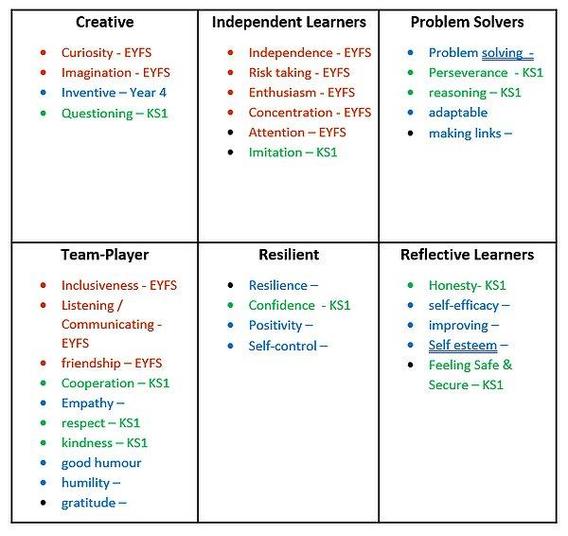During the academic year of 2018-19 St Mary’s Fields took part in a DFE and NHS project called Route to Resilience. The aim of the project is to improve mental health outcomes for children and staff. The school gained the Route to Resilience accreditation due to the work done on character muscles. (Please see further details in the accreditation)
A table of the 35 character muscles and the definitions can be found below.

Route to Resilience Character Muscles and Definitions
Early Years Foundation Stage
Curiosity: A strong desire to know or learn something. Asking questions to learn more.
Imagination: Forming new ideas, images, or concepts.
Risk-Taking: The ability to face challenges, even if they are daunting. Appropriate risk-taking is trying things even if they may fail. This includes courage.
Enthusiasm: Ready and keen to learn all there is to know, and to contribute and enjoy.
Concentration: The act of focusing your attention. The art of not being distracted.
Attention: to watch, listen and think about something carefully with interest.
Independence: Not relying on others to do things for you. Showing that you can learn to do things for yourself.
Inclusiveness: Allowing others to join in and not limiting yourself to certain people.
Listening/Communicating: Listening politely and respecting other people’s ideas. Sharing your own ideas freely and clearly with others.
Friendship: Involves trust, generosity, sharing, empathy and more. Shouldn’t be treated lightly or traded away.
Key Stage 1
Questioning: Asking questions if you’re unsure. Asking questions to develop deeper understanding and asking why.
Perseverance: Not giving up even when something is difficult, or you’d rather be doing something else. This includes determination.
Reasoning: The ability to think, talk, and write about things in a logical, sensible way. May involve seeing other points of view.
Co-operation: The ability to work together. May involve compromise or self-sacrifice
Respect: Admiring someone, and also listening to others and considering their views.
Kindness: Being generous, thoughtful, and friendly.
Confidence: Believing in yourself and your abilities. Not being shy of trying.
Honesty: Being honest and telling the truth. Doing the ‘right thing.’
Feeling Safe and Secure: Being able to feel relaxed and comfortable. You can help others to feel this too.
Imitation: Using something or someone as a model to learn from.
Key Stage 2
Making Links: Thinking in depth and connecting ideas and skills together
Self-Control: Restraining yourself from doing something that may not be appropriate at the time.
Improving: To make something better, in any way, than it already is.
Problem Solving: Using a variety of strategies and resources to help you solve something difficult. May involve perseverance.
Empathy: The ability to understand other people’s feelings, and find the best way to help or comfort them when they need it.
Humility: Being modest and not showing off.
Gratitude: Being thankful and showing appreciation.
Good Humour: Being in a good mood, and trying to brighten other people’s mood.
Resilience: The ability to recover from difficulties.
Optimism: Thinking positively and seeing the bright side.
Self-Efficacy: Believing that through your actions you can achieve.
Self-Esteem: Feeling good about yourself and others.
Inventive: having the ability to create or design new things and think originally.
Adaptable: Gratitude being able to change your ideas or behaviour in order to deal with new situations.